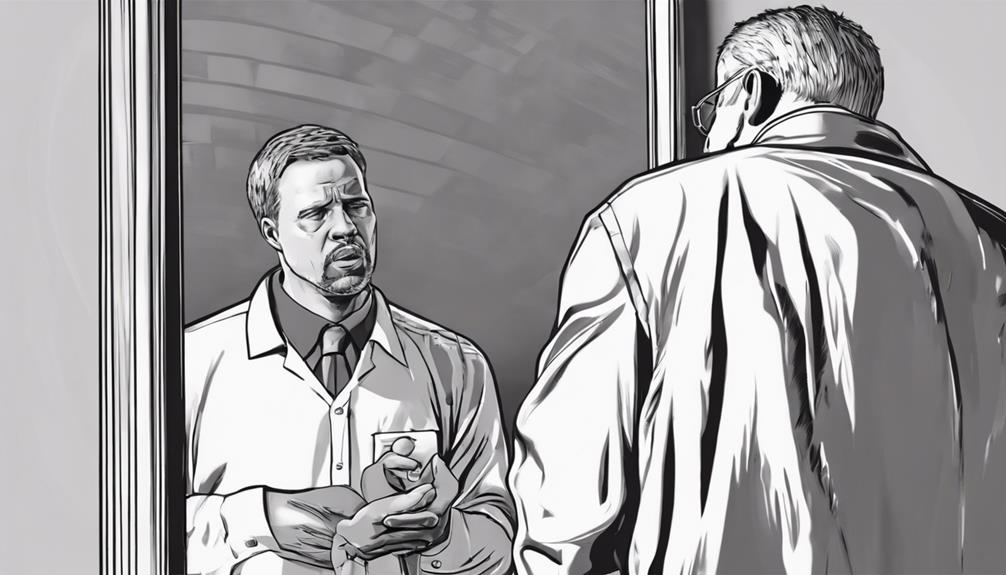Understanding Narcissism
Identifying a Narcissist Scapegoat Spouse: Signs and Red Flags
Kickstart your awareness of narcissistic behaviors in a spouse with signs of blame, criticism, and gaslighting tactics, unraveling a manipulative dynamic.

Recognizing a narcissist scapegoat spouse involves observing constant blame, belittling criticism, and gaslighting tactics that distort reality. Emotional manipulation and toxic dynamics may indicate warning signs of narcissistic abuse. Understanding gaslighting and projection can aid in identifying manipulative behaviors impacting relationships.
By recognizing these signs and red flags, individuals can better safeguard their well-being and mental health from toxic influences and seek support for healthier dynamics ahead.
Key Takeaways
- Constant blame and criticism erode self-esteem.
- Gaslighting distorts reality and undermines the spouse.
- Emotional manipulation and toxic dynamics are prevalent.
- Signs of narcissistic abuse and manipulation emerge.
- Red flags include emotional invalidation and trauma.
Recognizing Narcissistic Behavior Patterns
Identifying narcissistic behavior patterns in a partner is essential for understanding the dynamics of a potentially toxic relationship. In such relationships, emotional abuse, manipulation, invalidation, and trauma often characterize the experiences of the scapegoat spouse.
The narcissistic partner typically employs tactics like blame, criticism, isolation, and gaslighting to exert control and dominance over their spouse. Constant invalidation of the scapegoat's feelings, thoughts, and experiences serves to undermine their sense of self-worth and reality.
This ongoing pattern of abuse can lead the scapegoat spouse to develop low self-esteem, experience emotional distress, and exhibit signs of trauma. Isolation from support systems further reinforces the narcissistic partner's influence and makes the scapegoat feel responsible for the partner's behavior.
Red Flags of a Scapegoat Spouse

When observing a potential scapegoat spouse in a relationship with a narcissist, red flags often manifest in the form of being constantly blamed for issues and faults within the partnership. This consistent pattern of blame can lead to a significant deterioration in the scapegoat spouse's sense of self-worth and overall well-being.
Some common red flags of a scapegoat spouse in a narcissistic relationship include:
- Constant Blame: The scapegoat spouse is frequently held accountable for problems, failures, and conflicts within the relationship, even when they aren't at fault.
- Belittling Criticism: They're subjected to harsh and demeaning criticism, often in front of others, which serves to undermine their self-esteem and confidence.
- Distorted Reality: Gaslighting tactics are employed to manipulate the scapegoat spouse's perception of reality, making them doubt their own thoughts, feelings, and experiences.
These red flags serve as warning signs of narcissistic abuse and emotional manipulation, highlighting the toxic dynamics present in the relationship.
Signs of Emotional Manipulation
In examining the dynamics of a narcissistic relationship, it becomes evident that emotional manipulation tactics play a pivotal role in exerting control over the scapegoat spouse. One prevalent form of emotional manipulation is gaslighting, where the narcissistic spouse distorts the partner's perception of reality to maintain dominance. This insidious tactic can lead the scapegoat spouse to question their own sanity and judgment, fostering dependence on the narcissistic partner.
Moreover, the narcissistic spouse often employs guilt and shame as tools to shift responsibility onto the scapegoat spouse for their emotions and behavior. By instilling feelings of inadequacy and self-blame, the narcissistic partner reinforces their power and control over the relationship. Additionally, manipulation tactics such as invalidating the spouse's feelings and experiences serve to diminish their sense of self-worth and agency.
Through these calculated actions, the narcissistic spouse creates a climate of self-doubt and submission, effectively trapping the scapegoat spouse in a cycle of emotional dependence and manipulation. It's important for individuals in such relationships to recognize these signs of emotional manipulation and seek support to break free from the toxic dynamics imposed by a narcissistic partner.
Identifying Narcissistic Projection

Narcissistic projection involves deflecting one's negative traits or actions onto others as a means of evading personal accountability. This defense mechanism is often used by narcissists to protect their self-image and manipulate their scapegoat spouse.
Here are some signs and red flags to help identify narcissistic projection:
- Blame-Shifting: The narcissistic partner consistently blames the scapegoat spouse for issues that are actually their own, refusing to take responsibility for their actions.
- Gaslighting Tactics: The narcissist may distort reality, making the scapegoat doubt their own perceptions and memory, further reinforcing the projection.
- Consistent Accusations: Scapegoat spouses often find themselves unfairly accused of behaviors or traits that align more with the narcissistic partner's character.
Recognizing these patterns of projection is important in understanding the unhealthy dynamics at play. Seeking support to address these issues can help the scapegoat spouse navigate the manipulation and work towards a healthier relationship dynamic.
Understanding Gaslighting Tactics

Identifying patterns of gaslighting behavior is pivotal in recognizing and addressing manipulative tactics used by narcissists in relationships. Gaslighting is a manipulative tactic where the narcissist distorts the victim's reality, causing them to doubt their perceptions and memories. This emotional manipulation is aimed at controlling the victim, making them feel dependent on the narcissist for validation and truth. Victims of gaslighting often experience self-doubt, emotional distress, and a sense of isolation as their reality is constantly undermined. Recognizing gaslighting behaviors is essential to protect oneself from such manipulation and establish healthy boundaries in relationships. By being aware of these tactics, individuals can empower themselves to confront and address the narcissistic behavior effectively.
| Gaslighting Tactics | Description | Impact |
|---|---|---|
| Denying actions | Narcissist denies or downplays their actions | Victim feels confused and anxious |
| Distorting reality | Distorts victim's reality to control perceptions | Victim questions their sanity |
| Establishing control | Aims to make victim dependent on narcissist for truth | Victim feels isolated and emotionally distressed |
Frequently Asked Questions
How Do Narcissists Treat Their Wives?
Narcissists treat their wives with manipulation, control, and emotional abuse. They prioritize their own needs over their spouse's, displaying a lack of empathy and dismissing their feelings.
Gaslighting tactics are common, leading their wives to doubt their reality and sanity. Controlling behavior is used to maintain power and dominance in the relationship, keeping their spouse in a submissive and dependent position.
This pattern of behavior can create a toxic and damaging dynamic within the marriage.
What Does Intimacy Look Like for a Narcissist in a Long Term Relationship?
In a long-term relationship, a narcissist's version of intimacy often revolves around seeking validation and admiration from their partner, rather than fostering genuine emotional closeness.
Their focus tends to be more on fulfilling their own needs and desires, rather than building deep emotional connections.
This can create challenges in developing a relationship based on empathy and mutual support, as narcissists may struggle to understand or validate their partner's emotions.
What Are the Red Flags of a Narcissistic Husband?
When identifying red flags of a narcissistic husband, it's vital to pay attention to behaviors like:
- Constant belittling
- Lack of empathy
- Blame-shifting
- Gaslighting
- Emotional abuse
These tactics are used to maintain control and power in the relationship. Being aware of these signs can help us protect ourselves and seek the support we need to navigate such challenging situations.
How Do I Know if My Husband Is a Narcissistic?
We can observe signs of narcissism in a spouse by paying attention to consistent patterns of behavior. Lack of empathy, manipulative tendencies, and a constant need for admiration are key red flags. Additionally, entitlement, avoidance of accountability, and extreme reactions to criticism can be indicators.
Conclusion
To sum up, pinpointing a narcissistic scapegoat spouse can be demanding but essential for one's emotional well-being. It's like maneuvering through a maze filled with concealed traps and false promises.
By recognizing the signs and red flags of narcissistic behavior, emotional manipulation, projection, and gaslighting tactics, individuals can protect themselves from falling victim to toxic relationships.
Stay vigilant and trust your instincts when it comes to pinpointing and dealing with a narcissistic spouse.
Understanding Narcissism
5 Warning Signs of a Narcissistic Pastor
Marvel at the hidden traits of a narcissistic pastor, unraveling the complexities of their leadership dynamics – a must-read for churchgoers and curious minds alike.

When it comes to identifying warning signs of a narcissistic pastor, it's like trying to spot a peacock in a flock of pigeons; they tend to stand out.
But what happens when the shepherd becomes more focused on their own reflection than the well-being of their sheep? These warning signs can be subtle yet impactful, shaping the dynamics within a congregation.
Let's explore these indicators together and unravel the complexities that lie beneath the surface of pastoral leadership.
Key Takeaways
- Excessive self-centeredness leading to broken relationships and neglect of congregation's needs.
- Lack of empathy results in alienation and lack of support for congregants.
- Manipulative behavior like gaslighting and guilt-tripping for personal gain.
- Sense of entitlement fuels toxic power dynamics and demands for unwavering loyalty.
Excessive Self-Centeredness
In observing a narcissistic pastor, one can't overlook the telltale trait of excessive self-centeredness that permeates their interactions and decisions. This pastor, consumed by their own importance, often demonstrates a glaring lack of empathy towards the congregation they're meant to lead.
Their focus on self-promotion and selfish ambition can be starkly evident in how they prioritize their own needs above those of their flock. Church leaders with narcissistic tendencies may manipulate situations to showcase their talents or achievements, using the pulpit and ministry opportunities not for the betterment of others but to further their own agenda.
This self-serving behavior can lead to broken relationships within the congregation as individuals feel overlooked and undervalued. The insatiable appetite for validation and recognition drives their every action, overshadowing genuine care and concern for the well-being of the community they're entrusted to serve.
Lack of Empathy

Demonstrating a profound lack of empathy, narcissistic pastors often prioritize their own agenda and self-promotion over genuinely understanding and addressing the needs of their congregation. This deficiency in empathy can create a toxic environment within the church community, where individuals feel neglected and unheard. Here are key points to ponder:
- Superficial Interactions: Narcissistic pastors engage in interactions that lack depth and genuine care. Their conversations may be focused on themselves rather than on the well-being of their congregation.
- Dismissal of Struggles: When faced with the struggles of others, narcissistic pastors may struggle to empathize. They might dismiss or minimize the challenges faced by their congregation, failing to provide the necessary support and understanding.
- Emotional Disconnection: Due to their self-centered nature, these pastors find it challenging to connect with others on an emotional level. This disconnect can lead to a sense of isolation and alienation among church members, further perpetuating a harmful cycle of self-promotion over genuine empathy.
Manipulative Behavior

Utilizing charm and flattery, narcissistic pastors employ manipulative tactics to exert control over their congregation, often distorting reality and exploiting vulnerabilities to further their own agenda. This manipulative behavior can take various forms, including gaslighting, emotional manipulation, guilt-tripping, and even threats to maintain power and influence. By twisting the truth and distorting reality, these pastors create a sense of dependency and blind allegiance among their followers, leading to emotional harm and psychological distress within the congregation.
| Manipulative Tactics | Impact on Congregation |
|---|---|
| Gaslighting | Creates confusion and self-doubt among followers |
| Emotional Manipulation | Leads to feelings of guilt, inadequacy, and fear |
| Guilt-Tripping | Manipulates emotions to maintain control |
| Threats | Instills fear and compliance in the congregation |
| Distorting Reality | Creates a false narrative to serve the pastor's agenda |
It is important for individuals within the congregation to recognize these manipulative behaviors and seek support to prevent further exploitation and emotional harm.
Sense of Entitlement

Often, individuals may struggle to recognize the detrimental impact of a narcissistic pastor's sense of entitlement within a church community. This sense of entitlement can manifest in various ways, creating an environment where the pastor expects special treatment and privileges that go beyond what's reasonable or healthy.
Here are some key behaviors associated with a narcissistic pastor's sense of entitlement:
- Expecting Admiration: The pastor may believe they deserve constant admiration and praise from their congregation, seeking validation for their perceived superiority.
- Demanding Obedience: They may expect unquestioning obedience from church members, using their position of authority to enforce compliance with their wishes.
- Seeking Loyalty: Narcissistic pastors with a sense of entitlement often demand unwavering loyalty from their followers, prioritizing their own needs and desires over the well-being of the congregation.
This entitlement can create a toxic power dynamic within the church, where the pastor's ego takes precedence over the genuine spiritual growth and support of the community.
Need for Constant Admiration

The need for constant admiration in a narcissistic pastor's behavior is a driving force that greatly impacts their interactions and dynamics within the church community. These pastors crave praise and admiration from their congregation to bolster their inflated ego. They often expect special treatment and seek to be elevated above others, viewing themselves as uniquely deserving of adoration. Fishing for compliments and affirmation becomes a common practice for them, serving as a means to validate their perceived self-importance.
This insatiable need for admiration not only shapes their behavior but also influences how they engage with their congregation. Without a steady stream of admiration, a narcissistic pastor can become agitated, displaying negative reactions when their ego isn't adequately stroked. This constant hunger for validation can lead to a toxic environment within the church community, where the pastor's insistent need for admiration takes precedence over the spiritual well-being of the congregation.
Conclusion
To wrap up, identifying the warning signs of a narcissistic pastor is vital for maintaining a healthy church environment.
Just like a dark cloud hovering over a sunny day, these behaviors can cast a shadow on the spiritual well-being of the congregation.
By staying vigilant and addressing these red flags early on, we can guarantee that our community remains a safe and nurturing place for all members to grow in their faith.
Understanding Narcissism
Crafting a Polite No Contact Letter: A Step-by-Step Guide
Begin the journey of mastering delicate conversations with a Polite No Contact Letter guide that promises grace and empathy – where will it lead you?

As we traverse the elaborate terrain of relationships, we often encounter moments where communication becomes paramount. Crafting a Polite No Contact Letter holds the key to gracefully concluding connections while preserving mutual respect and understanding.
By following a structured approach that considers both parties' emotions and needs, this guide offers a roadmap for steering delicate conversations with grace and empathy.
Let's explore how this step-by-step process can empower individuals to express themselves authentically and honorably in challenging situations.
Key Takeaways
- Set clear boundaries with grace and firmness.
- Communicate need for personal healing and growth.
- Request respect for boundaries and privacy.
- Express gratitude for understanding and cooperation.
Understanding No Contact Letters
In exploring difficult relationships, grasping no contact letters is essential for setting healthy boundaries. When it comes to ending communication with a toxic individual, a well-crafted no contact letter can be a pivotal tool. This letter serves as a formal expression of your decision to say goodbye and prioritize your well-being. By clearly outlining your intention to cease contact and establishing expectations for respect, you're taking an important step towards reclaiming your space and peace of mind.
Writing a no contact letter requires a delicate balance of love for oneself and firmness in setting boundaries. It should be concise yet polite, conveying your message with clarity and assertiveness. Including reasons for implementing the no contact rule can help the recipient understand the necessity of this decision. Remember, this letter is about self-preservation and creating a safe environment for yourself. Crafting a thoughtful and respectful no contact letter is a critical step in taking control of your relationships and prioritizing your mental health.
Setting Your Boundaries Clearly

As we navigate the process of crafting a no contact letter, it becomes imperative to clearly establish our boundaries with precision and assertiveness. Setting boundaries is critical for our best interest, signaling the need to let the individual know that we are serious about ceasing all communication. When drafting your no contact letter, consider the following key points to effectively communicate your boundaries:
| Setting Boundaries | Example Statement |
|---|---|
| Communication Modes | I kindly request no phone calls, texts, emails, or in-person meetings. |
| Need for Personal Healing | I require space and time for personal healing and growth. |
| Respecting Decision | It is essential that you respect my decision and boundaries moving forward. |
| Polite Yet Firm Tone | I aim to convey my desire for no contact to be respected in a polite yet firm manner. |
Crafting a Respectful Message

Crafting a respectful message requires thoughtful consideration of the recipient's feelings and the clear communication of our boundaries with grace and firmness. When writing a goodbye letter, it's crucial to use the best tips to help convey your thoughts and feelings effectively. Here are some key points to keep in mind:
- Choose words that convey respect and boundaries in the letter.
- Clearly state the intention of implementing the No Contact rule.
- Avoid blaming or accusing language in the message.
- Express appreciation for past experiences but emphasize the need for distance.
- Offer well wishes for the recipient's future without engaging further.
Addressing the Recipient Thoughtfully

How can we guarantee that our message to the recipient is both considerate and empathetic? When addressing the recipient in a no contact letter, it is important to approach the situation with sensitivity and understanding. By using respectful and empathetic language, we can convey our decision to establish boundaries while still acknowledging the positive aspects of the relationship. Expressing our need for space and time for personal healing in a significant manner is vital for maintaining a compassionate tone throughout the message. It is important to avoid assigning blame or expressing negativity towards the recipient, focusing instead on our own needs and well-being. A relationship expert would advise that by crafting our message with empathy and understanding, we can effectively communicate our intentions while showing respect for the recipient's feelings.
| Make Sure | Relationship Expert | Empathetic Language |
|---|---|---|
| Acknowledge any positive aspects of the relationship | Express need for personal healing | Avoid blame or negativity |
Finalizing Your No Contact Letter

We consistently emphasize the importance of finalizing your No Contact letter by clearly stating your decision and expressing your need for personal healing and growth. As you learn how to write this significant piece, remember that even though you still care for the individual, your need for space is critical for your well-being.
When writing a letter to establish No Contact, make sure you convey your need for space and time to focus on your personal healing and growth. Respectfully request that the recipient honors your boundaries and privacy moving forward. Thank them sincerely for their understanding and cooperation in respecting the No Contact arrangement.
Conclusion
In the gentle dance of words, we delicately wove our feelings into a tapestry of closure. With empathy as our guide, we crafted a no contact letter that honored our boundaries and respected our shared history.
Through thoughtful reflection and careful consideration, we found a path to peace and closure. May this letter serve as a beacon of compassion and clarity in the journey of moving forward with grace.
Understanding Narcissism
Narcissists: Masters of Manipulative Tears
Intrigued by narcissists' tearful displays? Uncover the calculated manipulation tactics behind their emotional outbursts in this insightful exploration.

As we unravel the complexities of narcissistic behavior, one intriguing aspect that may surprise you is the manipulation tactics involving tears.
The facade of vulnerability and emotional displays by narcissists often serve as a powerful tool for control, leaving those around them perplexed by the true intentions behind the tears shed.
By examining the calculated responses and deceptive nature of their emotional outbursts, we gain insight into the intricate web of manipulation woven by these individuals.
Stay tuned as we uncover the subtle yet impactful ways narcissists utilize tears to further their agenda and maintain dominance in their relationships.
Key Takeaways
- Narcissists exploit tears by invalidating, criticizing, and controlling emotional displays.
- Deceptive apologies and fake empathy are tools to maintain power and influence.
- Laughing at vulnerability showcases lack of empathy and aims to manipulate emotions.
- Discouraging emotional expression helps narcissists assert dominance, exploit vulnerability, and manipulate situations.
Narcissists' Response to Tears
When faced with tears, narcissists often exhibit a range of manipulative reactions that aim to undermine and control the emotional state of the individual in distress. They may pretend not to notice the tears, offer insincere apologies, laugh at the emotional display, criticize for being emotional, or even instruct not to cry. Narcissists may use comforting gestures to later manipulate vulnerabilities, making the tears about themselves and creating discomfort.
Their lack of empathy leads them to focus on their needs, projecting their own discomfort onto others. Through strategic manipulation, they aim to control emotions, turning the spotlight on themselves and exploiting vulnerability for personal gain. Understanding their tactics can help individuals navigate these challenging interactions with narcissists.
Deceptive Apologies and Reactions
Narcissists' deceptive apologies and reactions serve as calculated tools to further their manipulative agenda, exploiting vulnerabilities and controlling the emotional narrative to their advantage.
- They offer insincere apologies to manipulate your emotions.
- Their reactions are carefully crafted to maintain control over the situation.
- Narcissists use fake displays of empathy to deceive and manipulate others.
- The goal is to make you doubt your feelings and reality, allowing them to maintain power and influence.
Laughing at Emotional Vulnerability
Laughing at emotional vulnerability showcases the callous disregard narcissists have for genuine human emotions. When we bare our vulnerabilities and show our emotional side, it's a moment of trust and authenticity.
However, narcissists see this as an opportunity for mockery and manipulation. Their laughter in the face of emotional displays reveals their lack of empathy and their inclination to exploit others' feelings for their benefit. It's a cruel tactic meant to diminish the validity of our emotions and make us doubt the sincerity of our own feelings.
Criticism of Emotional Displays

Moving from the aspect of laughing at emotional vulnerability, the criticism of emotional displays by narcissists unveils a deeper layer of their manipulative tactics and lack of empathy.
- Invalidation: Narcissists often criticize emotional displays to invalidate your feelings and make you doubt yourself.
- Control: Criticizing emotional expression allows narcissists to maintain control over the situation and manipulate your reactions.
- Projection: By criticizing your emotions, narcissists project their own discomfort onto you, avoiding dealing with their own feelings.
- Gaslighting: Criticism of emotional displays can be used as a form of gaslighting, making you question the validity of your emotions and experiences.
Discouraging Emotional Expression
Discouraging emotional expression can be a key tactic employed by manipulative individuals to maintain power and control over those around them. By discouraging others from expressing their emotions openly, manipulators create an environment where vulnerability is seen as a weakness.
They may belittle or criticize emotional displays, making individuals feel ashamed or embarrassed for showing their feelings. This tactic can lead to a sense of isolation and self-doubt, making it easier for manipulators to assert dominance and influence over their targets.
Additionally, by discouraging emotional expression, manipulative individuals can prevent others from seeking support or validation from outside sources, further solidifying their hold on those they seek to control.
Exploiting Vulnerability for Gain

By stifling emotional expression, manipulative individuals pave the way for exploiting vulnerability as a means to achieve personal gain. When they detect emotional openness, they see an opportunity to manipulate. Here's how they may exploit vulnerability for their benefit:
- Feigning Empathy: Offering false sympathy to gain trust.
- Playing the Savior: Providing support only to later demand favors.
- Shifting Blame: Using tears to deflect responsibility onto others.
- Leveraging Confessions: Encouraging oversharing for later manipulation.
Recognizing these manipulation tactics can help protect against being taken advantage of emotionally. Understanding the motives behind such exploitations can empower individuals to set boundaries and safeguard their emotional well-being.
Understanding Tears for Manipulation

Understanding tears as a tool for manipulation sheds light on the intricate ways narcissists exploit emotions for their own advantage. When a narcissist witnesses tears, they often see an opportunity to exert control or gain sympathy.
By feigning concern or offering false comfort, they aim to manipulate the situation to suit their needs. These tears, genuine or not, become a tool in the narcissist's arsenal of manipulation tactics.
They may use tears to deflect blame, elicit guilt, or maintain power dynamics within relationships. Recognizing tears as a potential manipulation tactic can help individuals navigate interactions with narcissists more effectively, understanding the underlying motives behind these emotional displays.
Lack of Empathy Towards Tears

Moving from the exploration of tears as a manipulation tool, we now examine how narcissists lack empathy towards emotional displays.
- Focus on Themselves: Narcissists prioritize their needs and ego over understanding and empathizing with others' emotions.
- Amusement Over Empathy: They often find emotional displays amusing rather than feeling compassion towards the person expressing emotions.
- Criticism Instead of Comfort: Discomfort around emotions leads narcissists to criticize rather than offer genuine comfort or support.
- Projection of Discomfort: Unable to cope with their own emotional discomfort, narcissists project this discomfort onto others, diminishing empathy towards tears.
Emotional Manipulation Tactics

Employing cunning tactics, narcissists manipulate emotions to serve their own agenda, preying on vulnerabilities for personal gain. They strategically use words to cultivate false trust, aiming to control emotions and exploit vulnerabilities for their benefit.
By offering comfort, they create a sense of indebtedness in their targets, turning emotional support into a tool for manipulation. Narcissists divert attention to themselves, making the distressed individual feel obligated to apologize or cater to their needs.
This emotional manipulation is a calculated move to assert dominance and secure their position of power over others. It's essential to recognize these tactics and set boundaries to protect oneself from falling prey to their manipulative behavior.
Frequently Asked Questions
Can Narcissists Ever Genuinely Empathize With Someone Who Is Crying?
We've observed that narcissists struggle to genuinely empathize with someone who's crying. Their focus on self often clouds their ability to connect with others' emotions.
While they may understand the concept of crying, empathy typically takes a back seat to their own needs and ego. This lack of genuine empathy can lead to manipulative behavior as they prioritize control and personal gain over authentic emotional support.
How Do Narcissists Justify Their Laughter at Someone's Emotional Vulnerability?
When narcissists justify their laughter at emotional vulnerability, they often deflect their discomfort onto the person showing emotions. By ridiculing vulnerability, they maintain a facade of control and power. This behavior serves to reinforce their superiority and diminish the other person's feelings.
Laughing at emotional displays allows them to avoid addressing genuine connections and further perpetuates their manipulative tendencies.
Do Narcissists Ever Feel Guilt or Remorse for Exploiting Someone's Tears for Personal Gain?
We've observed that narcissists rarely feel guilt or remorse for exploiting someone's tears for personal gain. Their focus is on their own needs and ego, often finding emotional displays amusing.
This discomfort around emotions can lead to criticism and projection of their own discomfort onto others.
The lack of empathy allows them to manipulate emotions strategically, turning the spotlight on themselves and exploiting vulnerabilities for their own benefit.
What Techniques Do Narcissists Use to Make Someone Feel Like They Owe Them an Apology for Crying?
When making someone feel like they owe them an apology for crying, narcissists often employ tactics that manipulate emotions. They might twist the situation to shift blame onto the crying individual, using strategic language to create a sense of indebtedness.
How Do Narcissists Manipulate Emotional Vulnerability to Establish Control Over a Person's Emotions?
When manipulating emotional vulnerability, narcissists exploit insecurities to gain control over our emotions. They prey on our need for validation, using calculated words and actions to foster a false sense of trust.
Conclusion
In the intricate dance of emotional manipulation, narcissists wield tears as their weapon of choice, using them to control and exploit those around them.
With deceptive apologies, criticism of vulnerability, and a lack of empathy towards tears, they master the art of manipulation.
Through their calculated tactics, they prey on emotional displays to further their own agendas.
In the end, tears become nothing more than tools in the hands of narcissists, used to maintain their power and dominance.
Our Content Strategist, Jordan, has a knack for deciphering the digital landscape to determine what our audience seeks. With a foundation in behavioral science and digital marketing, Jordan crafts our content strategy, ensuring that our topics are relevant, research-based, and resonant. Their strategic approach helps Narcissistic Man reach hearts and minds across the globe.
-

 How To Deal with Narcissism2 months ago
How To Deal with Narcissism2 months agoNarcissist Return Timeline: Factors & Predictions
-

 Divorcing a Narcissist2 months ago
Divorcing a Narcissist2 months agoHealing Together: Support Groups for Narcissistic Abuse Survivors
-

 How To Deal with Narcissism3 months ago
How To Deal with Narcissism3 months agoOutsmarting a Narcissist in Court: Strategies to Beat Them
-

 Covert Narcissist2 months ago
Covert Narcissist2 months agoThe Final Covert Narcissist Discard: Signs to Watch For
-

 Narcissistic Cheating Patterns1 month ago
Narcissistic Cheating Patterns1 month agoUnveiling Habits: Cheating Narcissist at Home Post-Affair
-

 How To Deal with Narcissism3 months ago
How To Deal with Narcissism3 months agoHow to Make a Narcissist Want You Sexually: A Step-by-Step Guide
-

 Covert Narcissist1 month ago
Covert Narcissist1 month ago10 Celebrities Who Display Covert Narcissist Behavior
-

 Covert Narcissist2 months ago
Covert Narcissist2 months agoWhat Are the Signs of Covert Narcissist Stalking?























